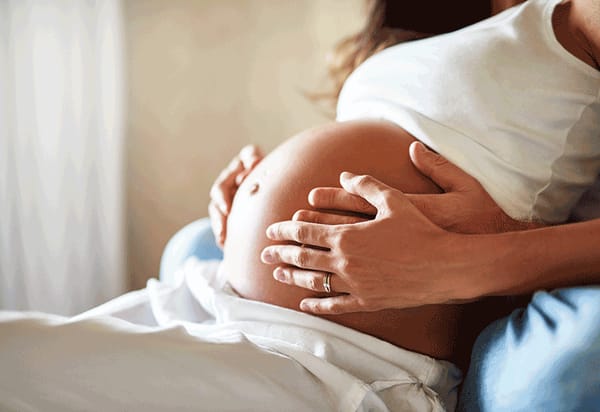Blog

GESTATIONAL DIABETES IN PREGNANCY
Sunday 10th October 2021
WHAT IS GESTATIONAL DIABETES?
Gestational diabetes is a type of diabetes that you develop when you’re pregnant and is when your blood sugar levels are higher than normal.
WHAT CAUSES GESTATIONAL DIABETES?
It happens when your body can’t produce enough insulin (a hormone that helps to control your blood sugar level) to meet your extra needs in pregnancy. As you’re not producing enough insulin, your blood sugar levels rise. Gestational diabetes can cause problems for you and your baby but there are things you can do to help reduce the risks and have a healthy pregnancy.
For most women who get gestational diabetes, it starts in the second half of their pregnancy and goes away when they give birth.
WHO IS AT RISK OF GETTING GESTATIONAL DIABETES?
There are some things that can increase your risk of getting gestational diabetes. You may be more at risk if you:
Are overweight or obese
Have had gestational diabetes before
Have had a large baby before who was 4.5kg or 10lb or over
Have a family history of diabetes
Are of a South Asian, black or African Caribbean or Middle Eastern descent
WHAT ARE THE SIGNS AND SYMPTOMS OF GESTATIONAL DIABETES?
It’s likely that you won’t notice any symptoms or signs of gestational diabetes and only know you have it when it’s picked up in a screening test. But if you do develop gestational diabetes symptoms, you may
Go to the toilet more often (to pee)
Feel more thirsty than usual
Feel extremely tired
EXPERT'S SUGGEST...
Although most of these are out of your control, you can reduce your risk of developing gestational diabetes by keeping to a healthy weight, eating a balanced diet and by getting plenty of exercise.
HOW IS GESTATIONAL DIABETES DIAGNOSED?
Gestational diabetes is usually diagnosed through a blood test. At your first antenatal appointment, your midwife will ask you some questions to see if you are likely to get gestational diabetes. Depending on your answers, your midwife may organise a blood test when you’re between 24 and 28 weeks pregnant. You might need to have it earlier if you’ve had gestational diabetes before.
The test to check for gestational diabetes is called an oral glucose tolerance test. You will be advised to fast (by not eating anything or drinking certain fluids) overnight before the test. A health professional will take a sample of your blood to check your fasting level of blood sugar and then give you a sugary drink. Two hours later, they’ll take another blood sugar sample. This shows how your body is processing the sugar within the drink. If there is more sugar in your blood than normal, a diagnosis of gestational diabetes may be made.
HOW IS GESTATIONAL DIABETES TREATED?
The key to treating gestational diabetes is to control your blood sugar level as this will reduce your chances of having problems.
First, there are some changes you can make to your lifestyle. Smoking doubles the risk of gestational diabetes so it’s more important than ever to quit. You can potentially lower your blood sugar levels through diet and exercise. Make sure you eat a healthy diet and get 150 minutes of moderate exercise per week – your midwife will give you advice about how to exercise safely while you’re pregnant. For some women this is all they need to do, but it is more likely that you might need to take medicines too, such as metformin tablets or insulin injections.
WHAT ARE THE RISKS TO MY BABY?
While most women with gestational diabetes have healthy babies, there are some potential problems that it can cause.
Your baby may grow larger than usual, which can make it much harder to give birth and cause them to become distressed. It’s more likely that you’ll need to be induced, or have a caesarean section.
You are more likely to get pre-eclampsia (high blood pressure), which can cause problems for you and your baby.
Your baby may be born prematurely (before 37 weeks).
There may be too much fluid surrounding your baby in your womb (known as polyhydramnios) which can cause you to go into labour too soon, or problems when you give birth.
Your baby may develop low blood sugar or jaundice, where they have yellow skin and eyes, after they’re born. They might need to be treated in hospital for this.
The condition raises the chance of stillbirth but thankfully this is rare.
HOW DOES GESTATIONAL DIABETES AFFECT MY PREGNANCY?
Your antenatal team will monitor you more closely during your pregnancy and birth to check for any potential problems. You'll be given a blood sugar testing kit too so you can check it yourself. Due to the added risks you will be advised to have your baby in a hospital obstetric unit.
If you have gestational diabetes, it's best to give birth before you reach 41 weeks. However, if problems arise during your pregnancy, or if your sugars are not well controlled, you may be advised to give birth before you reach term. If you haven’t gone into labour naturally by 41 weeks, your midwife or doctor will advise you on whether you should be induced or have a caesarean section.
After you give birth, your blood sugars will be monitored, and you will have a blood test between six and 13 weeks later to make sure that your sugars have returned to normal. In most women gestational diabetes goes away after they give birth.
After birth your baby is more prone to low sugar levels and you will be encouraged to feed your baby shortly after the birth. Your baby’s sugar levels will be checked when they are 2-4 hours old to make sure they are normal. You will be advised to stay in hospital for at least 24 hours after your baby is born to make sure they are feeding well and their blood sugar levels are staying normal.
WHAT SHOULD I EAT IF I HAVE GESTATIONAL DIABETES?
According to the NHS, making changes to your diet can help to control your blood sugar levels. You should be offered a referral to a dietician who will give you advice about your diet and you may be provided with a leaflet to help you plan out your meals. As part of this meeting, you may also be advised to:
Eat regularly and avoid skilling meals
Eat starchy foods that release sugar slowly, for example: whole wheat pasta, brown rice etc.
Eat plenty of fruit and vegetables
Avoid sugary foods
Avoid sugary drinks
Include lean sources of protein in your diet, for example, fish
CAN I PREVENT GESTATIONAL DIABETES IN FUTURE PREGNANCIES?
If you have gestational diabetes during this pregnancy, you are more likely to have it in future pregnancies too.
As gestational diabetes is much more common if you are overweight, taking steps to make sure your weight is at a healthy level before you get pregnant in the future is really important. After you give birth, ask your midwife or health visitor about a healthy eating plan and make sure that you are taking regular exercise. Weight management classes may also be available locally. A healthy BMI (a measurement calculated from your height and weight) of between 18.5 and 24.9 before you become pregnant again will help reduce your risk.
AM I MORE LIKELY TO DEVELOP TYPE 2 DIABETES IN THE FUTURE?
If you have had gestational diabetes, you are also more likely to develop life-long type 2 diabetes mellitus. So it’s important that you maintain a healthy lifestyle and keep to a normal weight through diet and exercise. You should have a blood test at your GP surgery every year to check that you are not developing diabetes. Let your practice nurse know that you will need this.





